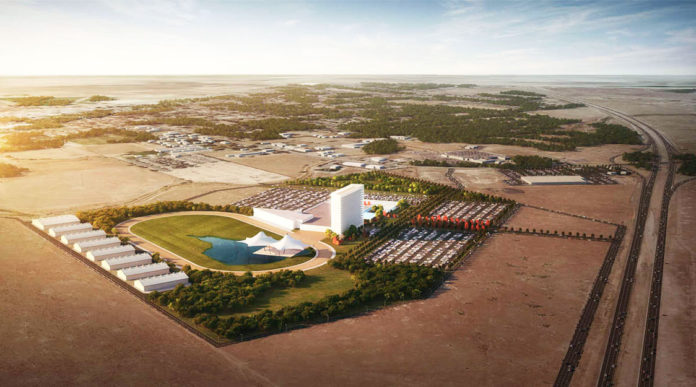FORT HALL, ID – In 2020, the Shoshone-Bannock Tribes (Tribes) purchased 157 acres in Elmore County adjacent to the City of Mountain Home for the purpose of economic development projects in order to generate revenue to provide for the basic human needs, employment, reduction of poverty, infrastructure, housing, roads, and to improve health and well-being for their Tribal members; in addition to improving the overall economy of the region.
“We are committed to being a good neighbor, employer and stewards of the earth,” said Fort Hall Business Council Chairman Lee Juan Tyler. “This project will benefit the broader Idaho community through job creation, training opportunities, business development and entertainment.”
Background
The land purchased is within the Tribes’ vast ancestral territory known as the Great Camas Prairie. The United States negotiated the Treaty of Fort Boise, Treaty with the Bruneau Shoshone, and the Long Tom Creek Treaty recognizing the expansive territory of the Shoshone and Bannock bands, but never ratified them.
Based on a 2021 assessment, the Tribes are proposing a casino resort complex that would include gaming, a hotel, restaurants, an event center, an amphitheater for concerts and other community entertainment venues, such as a movie theater, bowling alley and family video arcade.
The Tribes commissioned an economic analysis to measure the economic impact the project would have on the surrounding Elmore County community in terms of job creation, wages, and business revenue generated. The economic study involved looking at both the direct and indirect effect of the project on several economic levels. The project brings significant positive impacts to the Tribes, region and State of Idaho.
Economic Impact
The project is estimated to directly support 1,010 local workers annually, with annual labor income equaling $41.6 million and total added value to the economy of $174.9 million. These direct impacts drive a further $7.4 million in added value to the economy and 145 jobs from indirect and induced effects. In total, the local region is estimated to benefit from annual employment impacts of 1,155 workers, $45.7 million in labor income and $182.4 million in total value added.
Combining the local and other state impacts, the project is estimated to inject a total value added of $187.2 million into the local and state economy annually. $2.3 million of tax revenue would accrue to the state government.
Applications Submitted
On June 8, 2023, the Tribes submitted two applications to the Department of Interior (DOI) for approval of placing the 157 acres of land into trust status, and the operation of gaming on the property. The DOI is reviewing the application and is preparing a title opinion to ensure that the land is viable to be placed into trust.
The Tribes entered into a tri-party agreement with the United States and the Montrose Environmental firm to complete an environmental assessment as part of the review process. The environmental assessment work is moving forward with many surveys and assessments of land, hazardous waste, cultural and historical surveys, traffic, and other potential impacts to air, water and land which are nearly completed.
“These applications are a lengthy and complex process, as we have explained to the City of Mountain Home and Elmore County Officials in several meetings and conversations over this past year,” said Alonzo Coby, Planning Director for the Tribes. “While it may seem as if we are not making progress publicly on the project, that is not the case. There is a lot of behind the scenes work happening to meet the application requirements and continue the planning process for a project of this size.”
Commitment to Elmore County and City of Mountain Home Communities
The Tribes, Elmore County Commissioners and the Mountain Home City Council are currently negotiating memoranda of agreements for law enforcement, fire protection, emergency management services and water services for the project. Over the past two years, The Tribes have held meetings with hundreds of citizens at open houses, county staff and elected county and city representatives to listen, answer questions, gather input, and gain an understanding of their views concerning the project.
“We have received overwhelming support for the project from citizens in the community as they have a desire to build a better future for their families and community,” said Coby. “They recognize the potential of the project to bring jobs, new businesses, increase revenue, and provide community and social activities such as a new hotel with restaurants, movie theaters and a bowling alley.”
Next Steps
The Department of Interior is currently at the stage of examining the title of the property and issuing a title opinion. Once this is completed, a Notice of Application for 30-day comment period will be placed in the federal register. Because the land will be taken into trust after the passage of the Indian Gaming Regulatory Act (IGRA), gaming can only be conducted on the land under an exception outlined in IGRA. The DOI is also conducting a review called a Secretarial Two-Part Determination. This review requires the Secretary of Interior determine gaming on the land is in the best interest of the tribe and that it is not detrimental to the surrounding local community; and that the governor of the state concurs.
















































